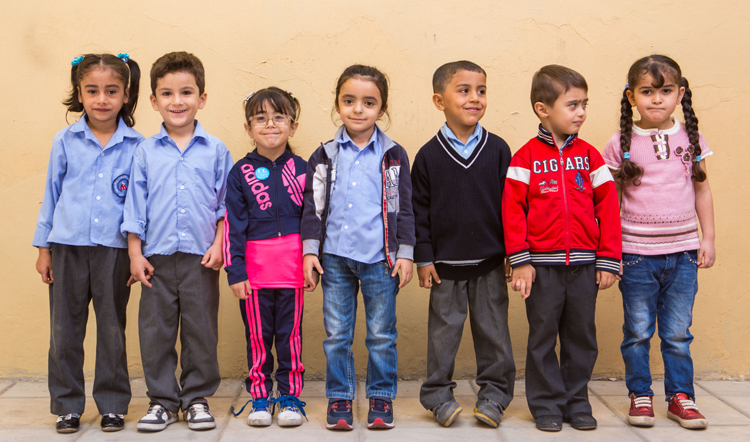Nazarene schools in Middle East teach refugee children to hope

In the five and a half years since Syria began experiencing a complicated, brutal civil war, more than 400,000 civilians have died in the crossfire. Another 11 million have left their homes to flee violence or persecution, either displaced within the country or living as refugees outside its borders. That number represents fully half the pre-war population of the country. The vast majority of Syrian refugees are living in neighboring countries in the Middle East, including Jordan and Lebanon. Almost 2 million refugees from Syria are living in those two countries, where Nazarene churches have been ministering to the growing numbers of refugees in their communities for more than four years.
The process for Syrian refugees to obtain legal work permits in Jordan is costly and difficult, and Lebanon has chosen not to issue work permits. As a result, the vast majority of refugee families are living below the poverty line in their host countries. Parents struggle to provide the basic necessities for their children, and the costs related to schooling for children is out of reach for most refugee families. Jordan and Lebanon do not have the resources and infrastructure to provide free public education to all of the children living there as refugees, and hundreds of thousands of children have lost out on years of schooling. Experts warn that without education, the children born to the war in Syria will become a “lost generation.”
In response to the needs of refugee families in their communities, Nazarene churches in Jordan and Lebanon have been working to address the problems of poverty and hunger and education for children. Over the course of four years, churches have provided food and household supplies for many thousands, and Nazarene schools have provided education for hundreds of children affected by the war.
In Jordan, church leaders recently completed the construction of a training center geared for those living as refugees, including those from both Syria and Iraq. The center offers English classes at various levels, handcrafts training, and computer courses, along with Bible studies and children’s activities. Currently more than 110 students are taking English classes.
In addition to food aid and education, one church in Lebanon is also making sure refugee families can access health care. They recently set up a clinic that received more than 200 patients over the few days it was open. Congregations in Lebanon are helping resettle both Syrian and Iraqi families, who have fled their countries for similar reasons. They are currently providing food packages to 210 families a month with plans to increase the number to 300 in January, as well as providing hot meals and fellowship for a smaller number through the Agape Table ministry.
Nazarene schools in both Jordan and Lebanon are also providing scholarships to children living as refugees who would not otherwise have an opportunity to continue their education. In Lebanon, the church is also providing informal education to children through STEP, the Syrian Temporary Education Program.
In addition to addressing gaps in education, the schools and educational programs must address the psychological and social needs of children who have been traumatized by war and displacement.
Tarek* and his family fled from Syria when they began to fear for their lives. When they arrived in Jordan a few years ago, they were exhausted, homeless, and out of money. The trauma Tarek experienced manifested as a speech impediment, making him an easy target for bullies in his new home.
“Actually, I was destroyed from the inside out,” said Tarek, now age 11.
When he began attending the Nazarene school nearby, he slowly experienced healing. Not only did he catch up in his school work after missing years of formal education, but his speech problems also subsided.
“Thanks for the Nazarene school for helping me to feel that I’m still a human being,” he said.
Like Tarek, Halil* and his family fled the violence and persecution in their homeland. Haili’s father was kidnapped in Syria, and his mother took him and his brother to safety in Lebanon.
Unable to afford to pay for her boys’ education, Halil’s mother turned to the Nazarene school in their new neighborhood.
“I love my mom,” Halil said. “She sacrificed so much for us.”
Halil says that school is a struggle sometimes, but he knows it will help him achieve his dreams and help improve life for his family.
“The Nazarene school always encourages us and gives us hope to continue our education,” he said. “They are like a family to me and they help me move forward and evolve in life.”
Halil has also found hope in his newfound faith. “My spiritual life is great,” he said. “I know Jesus, and I took Him as a personal savior.”
With no end to the violence in Syria in sight, families like Tarek’s and Halil’s continue to seek refuge in Lebanon and Jordan. Right now, the countries are collectively hosting almost 2 million people. Half of them are children.
Children living as refugees in Lebanon and Jordan have experienced death, fear, and dehumanization in a way that no one should ever experience. As Nazarene schools have provided a place of safety and stability for children living as refugees, they have opened the door to healing.
This year’s NCM Christmas Project will provide more scholarships so children can experience healing and hold on to hope for the future.
To learn more or support education for children living as refugees, visit ncm.org/Christmas.
--Nazarene Compassionate Ministries
*All children’s names have been changed for their protection and safety.
